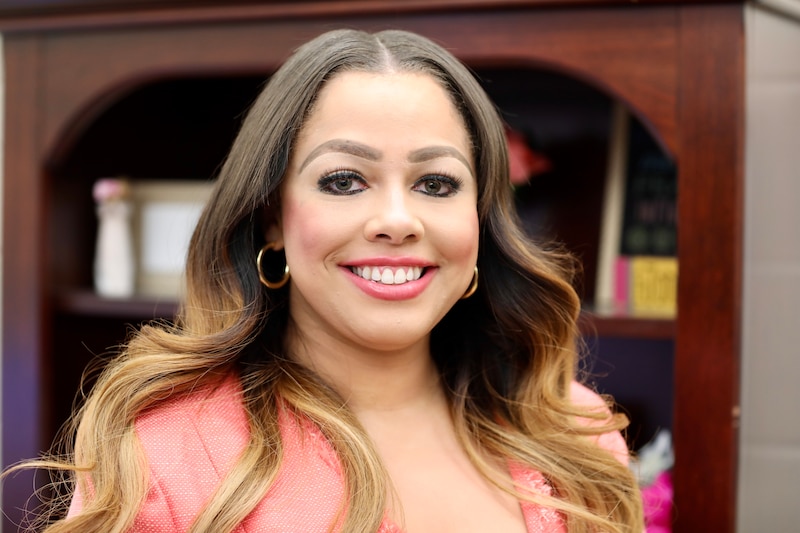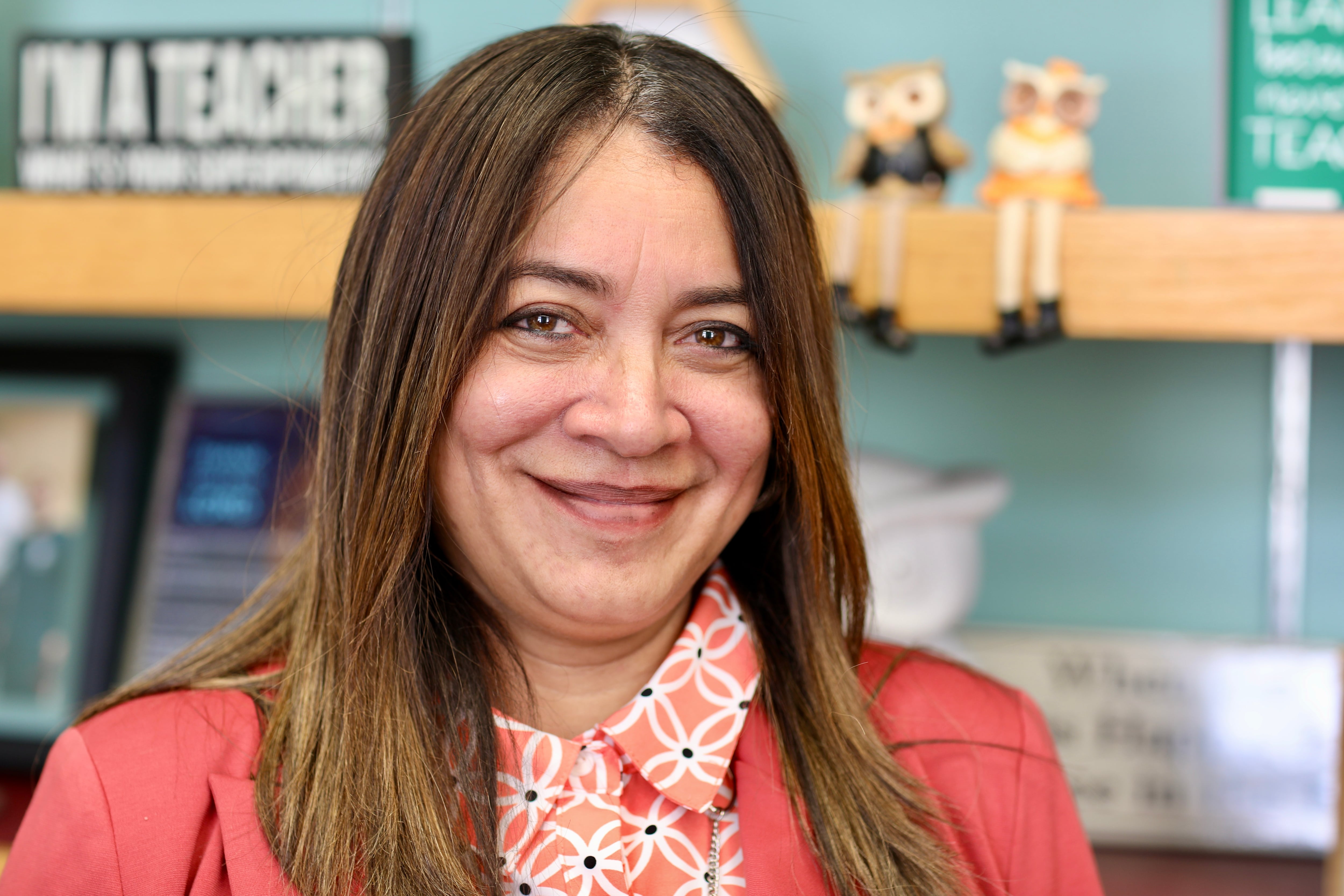Lillian Izzard grew up in the Philadelphia neighborhood around Edison/Fareira High School in a single-parent family with five siblings. As a high school student at a Catholic school in the 1980s, she watched the construction of Edison, grand and modern for its day, in awe.
A 33-year veteran of the school district, Izzard is now Edison’s principal. As hard as the assignment is — given that her students generally come from low-income backgrounds and must deal with issues including addiction and violence — Izzard couldn’t be happier. Since her appointment less than a year ago, she has helped create an equity coalition at the school and helped students build constructive social connections.
“I had always wanted to be here,” she said.
About a mile away, Amanda Jones works as the principal of Luis Muñoz-Marin Elementary School, a K-8 school that serves as a feeder school for Edison/Fareira. Jones, the daughter of educators who grew up in integrated, middle-class Mount Airy, graduated from Masterman High School and has worked at the school for 10 years, where she’s overseen improvements in test scores and prioritized attendance and student government.
“The people in this building bring me joy,” she said.
For their work, Izzard, Jones, and five other principals won the Lindback Award for Distinguished Principals, the district’s most prestigious honor for school leaders. Each award, which the district presented last week, comes with $20,000 for principals to use to improve their schools. The two educators relish the chance to build relationships with families and children, and provide places of potential and stability, in one of the most challenging areas of the city.
When the principal’s job at Edison opened up last year, Izzard was principal of Fels High School in the Lower Northeast, a place she could have “happily retired from,” she said. But although she was initially reluctant to change jobs, she felt the pull of her old neighborhood and the challenge of leading Edison.
The school, in a neighborhood plagued by poverty, drugs and violence, has an enrollment of around 850, there is so much transience that many of the many of the students who started the school year at Edison aren’t the ones who finish it. Nearly a quarter of the students don’t speak English as their first language, and a quarter receive special education services.
After getting the job, she spent a month in the summer alone in the building, she said, planning and strategizing before teachers and students returned.
“I came with a vision. This is a school in my neighborhood that services a lot of students who look like me,” said Izzard, who is of Puerto Rican descent. “I wanted to create opportunities for them I would have liked to have for myself if I was a student here.”
Among the changes she made right off the bat: She reintroduced Spanish classes for native speakers, as well as Honors Spanish. She also took steps to integrate special education students into school activities, including into its media center and instructional trips to the community.
And the equity coalition she formed brings together students, staff, and administration to address community issues by “identifying and providing resources and opportunities” for those “who have been denied such from racial or gender disparities.”
Another major change she made of a different kind was to require students, and staff, to put their cell phones inside Yondr bags, which prevent them from being used during the school day. Despite some early resistance, the move has changed the school’s atmosphere. Izzard said teachers have told her how students are now more engaged in the classroom.
At the same time, she plans to use the Lindback money to create a “multi-purpose space” where students can expand their social networks, and explore how their passion for video games and other online diversions can lead to jobs in esports and the gaming industry.
“After months where students were not able to socialize in person,” Izzard wrote in a statement for the Lindback judges, referring to the pandemic, “gaming showed that students benefited by improving their creativity, memory and teamwork.”
”While she is close to being eligible for retirement, she said, “I don’t think I’ll be going out next year. I want to really take the school as high as I can take it before turning it over to someone else.”
Leading a school turnaround effort
Jones arrived at Muñoz-Marin as a teacher in 2013. Three years later, she helped fend off an effort to convert the struggling school to a charter as part of the district’s turnaround strategy under the School Reform Commission. She became principal in 2020.
Instead, she helped lead an internal turnaround effort that saw improvements in math and reading scores among students who, like Edison’s, live in a poverty-stricken neighborhood plagued by gun violence and addiction.
“We got new teachers to join the staff and introduced a new curriculum,” she said. “And we got a lot of funding that we didn’t have before.”

The money paid for more teachers, including interventionists for reading and math, a climate manager, a behavioral specialist, an additional counselor, “and mental health supports we didn’t have before,” Jones said.
Jones hasn’t just hired new staff, but kept educators at the school. This year, the district started the school year with more than 200 vacancies, but Muñoz-Marin had only one.
But the challenges in the school, which enrolls around 500 students, are great. Many of the students miss big chunks of the school year as families go back to Puerto Rico for months at a time. “Attendance is something we’re struggling with,” she said.
She has created incentives to encourage more regular attendance, including a family barbecue for those who met targets.
In addition, Jones has established a student government in which only students with good attendance are eligible. The student officers “are able to make decisions” about important issues, she said, and hold town hall meetings once a week.
While Jones comes from a family of teachers, she studied Communications at Bloomsburg University, changing her career focus after working with single mothers one summer. She said her experience at the school has helped her understand the importance of creating connections with the Muñoz-Marin community.
“It’s kind of interesting to lead in the building where you started,” she said. “For example, my eighth graders that are graduating, I was their kindergarten teacher. So I am very strong at [building] ties, especially with the families, just because I’ve been here for so long.”
Dale Mezzacappa is a senior writer for Chalkbeat Philadelphia, where she covers K-12 schools and early childhood education in Philadelphia. Contact Dale at dmezzacappa@chalkbeat.org.






